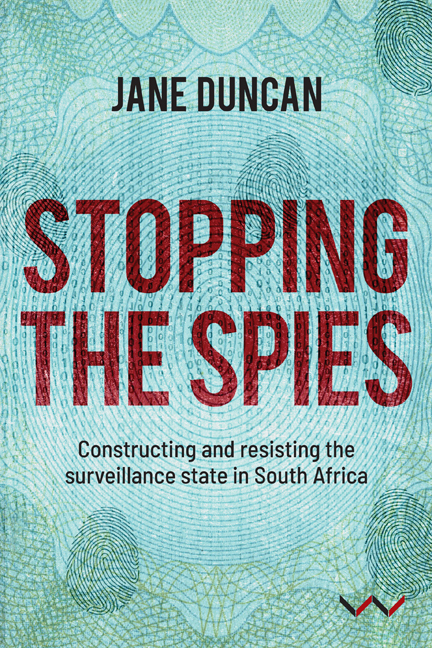Book contents
- Frontmatter
- Contents
- Acknowledgements
- List of Figures and Tables
- List of Acronyms
- Preface
- Introduction
- Chapter 1 Theorising the surveillance state
- Chapter 2 Is privacy dead? Resistance to surveillance after the Snowden disclosures
- Chapter 3 The context of surveillance and social control in South Africa
- Chapter 4 Lawful interception in South Africa
- Chapter 5 State mass surveillance, tactical surveillance and hacking in South Africa
- Chapter 6 Privacy, surveillance and public spaces in South Africa
- Chapter 7 Privacy, surveillance and population management: the turn to biometrics
- Chapter 8 Stopping the spies: resisting unaccountable surveillance in South Africa
- Chapter 9 Conclusion
- Notes
- Select Bibliography
- Index
Chapter 1 - Theorising the surveillance state
Published online by Cambridge University Press: 17 May 2019
- Frontmatter
- Contents
- Acknowledgements
- List of Figures and Tables
- List of Acronyms
- Preface
- Introduction
- Chapter 1 Theorising the surveillance state
- Chapter 2 Is privacy dead? Resistance to surveillance after the Snowden disclosures
- Chapter 3 The context of surveillance and social control in South Africa
- Chapter 4 Lawful interception in South Africa
- Chapter 5 State mass surveillance, tactical surveillance and hacking in South Africa
- Chapter 6 Privacy, surveillance and public spaces in South Africa
- Chapter 7 Privacy, surveillance and population management: the turn to biometrics
- Chapter 8 Stopping the spies: resisting unaccountable surveillance in South Africa
- Chapter 9 Conclusion
- Notes
- Select Bibliography
- Index
Summary
This chapter examines possibly the most important concept used in this book, namely surveillance. It identifies some of the ways in which surveillance has been conceptualised and theorised, and how these theorisations have changed over time. As Alan Sears has argued, theory is not a mere neutral tool, but a guide to action. The value of theory is that it helps us to ask and answer causal questions that cannot be answered at the level of fact alone. If the problem – to the extent that there is one – is not correctly understood, then it becomes more difficult to craft effective intervention strategies. There can be little doubt that technological developments associated with computerisation have made surveillance easier, but does this automatically mean that these recent developments are negative in nature? Surely, surveillance can also have positive effects? Given the extent to which surveillance has become pervasive, how do the different elements of surveillance relate to one another? Are we really looking at a ‘Big Brother’-type scenario, where different surveillance actors combine their efforts to track and control people from the cradle to the grave? Or are the more benign elements of surveillance really nothing to worry about, with the threats being overstated by more paranoid elements of society? This chapter focuses on theoretical debates about these specific questions, as they impact on what we define as surveillance, and how we mark it out from other forms of information collection and analysis. Such questions matter, as answering them will help us answer the broader question of how worried we should be about these developments.
FOUCAULT AND THE PANOPTICON
It is impossible to discuss the concept of surveillance without invoking Michel Foucault and his appropriation of Jeremy Bentham's panopticon as a metaphor for the kind of surveillance being undertaken by the NSA and its UK counterpart, GCHQ, and other state surveillance actors in the present time. In his book Panopticon, Bentham defined surveillance as ‘a new mode of obtaining power of mind over mind, in a quantity hitherto without example’. Bentham's definition is significant, as it links surveillance directly to social control.
- Type
- Chapter
- Information
- Stopping the SpiesConstructing and resisting the surveillance state in South Africa, pp. 21 - 36Publisher: Wits University PressPrint publication year: 2018

